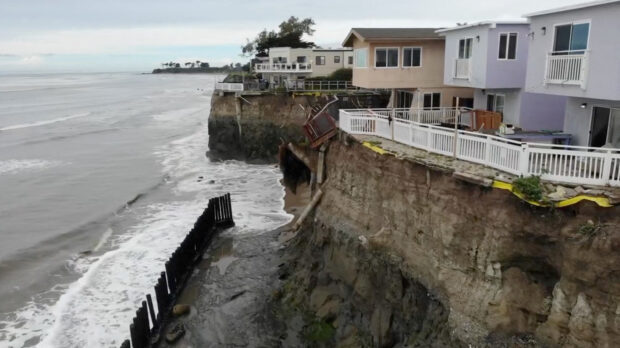
Parts of a cliff erode in Santa Barbara, California, U.S., in this screengrab taken from a handout video released on February 6, 2024. Bonillo and LeFebre/Santa Barbara County Fire Department/Handout via REUTERS
LOS ANGELES — A final burst of heavy rain from a deadly atmospheric river storm doused California’s Central Coast on Wednesday as it headed for Los Angeles, bringing a renewed threat of mudslides and floods to a region soaked for days by record downpours.
The storm’s last gasp in California came as the confirmed number of storm-related fatalities statewide rose to at least six, according to the governor’s Office of Emergency Services.
Up to 1 inch (2.5 cm) of rain was forecast for the Los Angeles area from the impending late-evening blast, on top of 6-13 inches that fell during four days ending at midday Wednesday as the storm’s center moved through Arizona, the National Weather Service (NWS) said.
READ: Record rain, triple-digit winds, mudslides: California storm by numbers
Flood-watch advisories and warnings remain posted for much of Southern California, with forecasters saying it would take little additional rain to unleash a dangerous new round of debris flows and collapsing hillsides.
“On any other day, it would be no big deal, but because the ground is so wet, we’re concerned,” Ryan Kittell, an NWS forecaster in Los Angeles, said of the last bit of precipitation expected late on Wednesday.
As of Tuesday evening, Los Angeles municipal officials said storm crews had responded to reports of 475 mudslides and nearly 400 toppled trees within the nation’s second-most-populous city.
Fire Chief Kristin Crowley said at least three dozen buildings required inspection due to mudslide damage and hillside slope failures, with seven structures deemed unsafe for occupancy.
The onslaught of rain, coupled with heavy snow in mountain areas, will go down as one of the wettest storms to hit Southern California in more than 150 years, according to meteorologists.
Rainfall in downtown Los Angeles from Sunday through Tuesday measured more than 8.5 inches, the second-highest consecutive three-day total since records there began in 1877, according to the NWS.
The previous record was 9.2 inches in the winter of 1938. The latest three-day sum represents 60% of downtown L.A.’s yearly average rainfall, 14.25 inches.
READ: LA logs 475 mudslides in historic Southern California storm
Rainfall across the region varied markedly. The rain gauge at the University of California, Los Angeles, located in the hills of Bel Air, recorded more than a foot over three days.
Storm damage, road closures, traffic collisions and evacuations across Southern California extended far beyond the Los Angeles city limits, encompassing a sprawling seven-county area of some 21 million residents.
Some 68,000 homes and businesses in California remained without electricity as of Wednesday, according to online utility tracking service Poweroutage.us.
The storm was the product of a weather phenomenon called an atmospheric river, a vast airborne current of dense moisture funneled inland from the ocean. The latest storm kicked off with heavy rains and powerful winds across northern and central California on Saturday before spreading to the south on Sunday.
At least three people were killed when wind toppled trees on Sunday in Sacramento, Santa Cruz and Sutter counties, authorities confirmed earlier this week.
A fourth fallen tree death from Sacramento County on Saturday was added to the official tally issued on Wednesday by the Office of Emergency Services (OES), along with two vehicle fatalities on Monday in San Bernardino County, bringing the total to six.
OES also reported three deaths dating from last Thursday and Friday, apparently attributed to a weaker, shorter-lived atmospheric river that preceded the latest storm – a river drowning in San Diego, a hospice patient who died in a San Luis Obispo County power outage, and a car crash in San Mateo County.
Rain and snow from the storm also hampered attempts early on Wednesday to locate five crew members from a U.S. Marine Corps helicopter that crashed east of San Diego during a routine training flight. The San Diego County Sheriff’s Department said it could not reach the area with its own helicopter due to the rough weather.